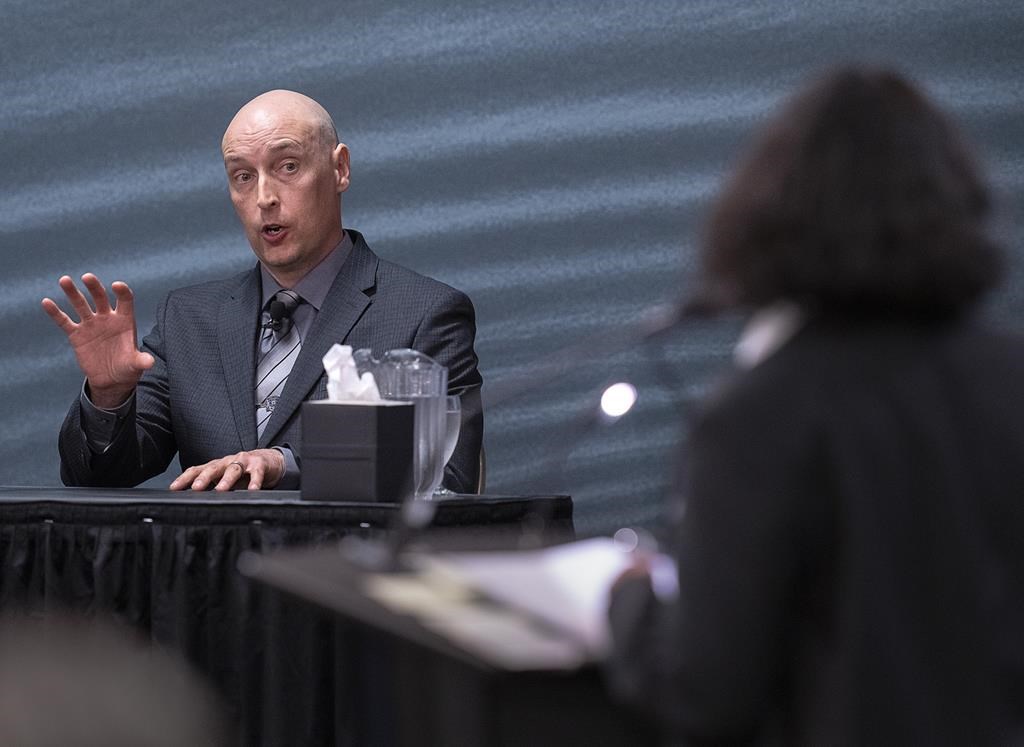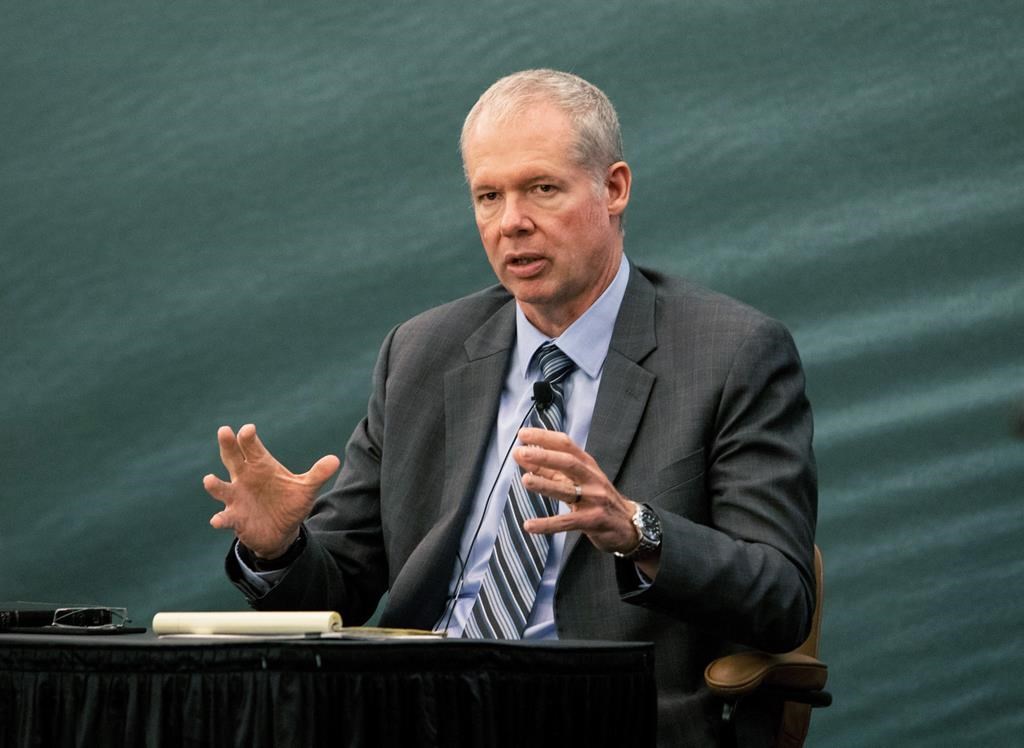Throughout the inquiry examining the 13-hour killing rampage that began in Portapique, N.S., on April 18, 2020, several senior police officers have testified about a division between the RCMP and municipal police forces in the province.

Communication between agencies, the RCMP’s tracking of costs and its push for more in-depth policing standards, a “turf battle” between the RCMP and Halifax Regional Police, and criticism are some of the reasons said to be behind it.
“I do have a lot of faith and confidence in the police officers on the street who do want to get along,” RCMP Chief Superintendent Darren Campbell, Nova Scotia’s support services officer at the time of the shootings, testified at the inquiry on July 25.
“They do want to work together, and they do have a complete understanding of each other’s challenges.”
A ‘disservice to public safety’
But from a “management perspective,” Campbell said relations have deteriorated post-April 2020.
“I don’t think that those relationships have gotten any better,” Campbell said. “In fact, I would say that they’ve gotten worse.”
Halifax Regional Police Chief Dan Kinsella testified that issues at the “higher level, strategically,” started prior to the 2020 killings.
Leanne Fitch, a commissioner for the inquiry, a former Fredericton police chief, and a one-term vice-chairperson of the inaugural RCMP Management Advisory Board, took exception to senior police officers saying the issues are only at the highest levels.
“The reality is that it makes a huge difference to the people on the front line,” she said in part to Kinsella on Aug. 25.
“If there are barriers, because there is lack of cooperation and communication and relationships at the senior management level, we’re not going to get past that. And that’s a disservice to public safety, community safety and well-being everywhere, including other first responders.”
Standards cause ‘rift’
Nova Scotia RCMP’s commanding officer at the time of the attacks testified that municipal forces have opted to “distance” themselves from the force following the massacre.
“In any case, in relationships, you have to have both parties willing to come to the table and work together,” she testified. “I don’t know that we’re there right now.”

Get daily National news
Still, Bergerman agreed it’s “absolutely” critical that police agencies try to get back on the same page.
But she also said that “certain chiefs would publicly say negative things” occasionally, and that she believes the RCMP’s push for more policing standards “has caused a rift between the RCMP, the Department of Justice and municipal policing agencies.”
When asked why that would be the case, she said the question is better suited for a chief of police, but said standards typically mean specialized units, like an emergency response team (ERT), which can be “cost-prohibitive” for municipalities.
Nova Scotia’s policing standards are currently under review, according to the Department of Justice’s website.
Bergerman also said the RCMP started tracking costs when its specialized units, like ERT or K9 services, would respond to assist other police forces.
That started with a goal of showing the province why the force had deficits.
“My understanding of it is there wasn’t a lot of dialogue and explanation on how this was going to happen or the purpose it was going to happen,” Kinsella testified. “And any time change is thrust upon any of us without any dialogue, we’re like, ‘you should had some conversation about that, right?'”
Municipal police involvement and voting relegation
According to a written response to a subpoena, Kinsella said more than 100 Halifax Regional Police officers were deployed throughout April 18 and 19, 2020, with 12 ERT members responding, including seven of whom he believed were assigned to patrol the HRM border.
Halifax police were also tasked with ensuring members of Lisa Banfield’s family — the gunman’s spouse — were safe, given they “may be in danger due to their relationship with Gabriel Wortman.”
During his testimony, Kinsella said he reached out to senior RCMP brass on two occasions, asking if they could help.
He said those offers were ultimately non-committal, but that “we did everything we were asked” by the RCMP to assist.
Kinsella was also asked about a September 2021 “wellness report” commissioned by the RCMP, which noted that Mounties said there was an ongoing “turf battle” between the Halifax police and the Nova Scotia RCMP regarding funding and control over police operations.
The report, released in a redacted form at the public inquiry, quoted officers accusing Halifax police leadership of “doing everything” they could to “undermine and break the relationship with the RCMP in order to access more resources from (Halifax Regional Municipality) and the province.”
In April 2022, tensions grew even more. That’s when the Nova Scotia Chiefs of Police Association voted to relegate the RCMP’s membership, meaning it no longer has a vote. The association’s website says its role is to represent policing “on many committees” at all three levels of government.
“We may not have aligned on the RCMP leadership with some of the where they fell on a few of the issues,” Dave MacNeil, Truro’s police chief, testified in June. “There’s been a few over the last two years, but it’s some directly related to this tragedy here.”
He said the topic of the Alert Ready system is one example.
“Nova Scotia chiefs disagreed with that narrative and we suggested that we weren’t going to support that publicly,” MacNeil testified. “That caused a bit of concern among police leaders.”
MacNeil himself only learned that the gunman drove through his town days later.
“Well, we didn’t find out until it was on the news, probably — and I’d be guessing now — but, a week, five days after the event,” MacNeil said. “No one reached out and told us that happened.”
“It caused a bit of concern in the community. You know, citizens were upset, the mayor was being emailed. And of course, then they were reaching out to me to find out how did this happen? Why didn’t you tell us what happened? And I had no idea it happened.”
Family lawyer asks if relations impacted response
Jane Lenehan, a lawyer for the family of Gina Goulet — who was the last victim killed in the attack and who lived close to Halifax Regional Municipality — says her clients are concerned whether the fractured relationships had anything to do with her death.
Several of her questions to senior police officers were about the relations and if they had an impact on the outcome.
She said that the turf battle “is frustrating” and that there’s “probably not a whole lot of patience” among families of the victims.
“Do you think there were any interpersonal issues or organizational relationship issues that affected the response to the mass casualty events?” Lenehan asked Bergerman.
“No, I don’t,” she testified.
New management could help
Since the April 2020 massacre, four senior Mounties have moved on; something that is “noteworthy,” the inquiry was told.
Chief superintendent Janis Gray and assistant commissioner Lee Bergerman have both retired, while Chief Supt. Chris Leather is taking on a new job at the RCMP’s national headquarters in Ottawa, and Chief. Supt. Darren Campbell also took a new job with the force in New Brunswick.
“It’s noteworthy in terms of relationships with municipal police,” Leather said on July 27, “because for me, again, to repeat myself, it takes away any excuse or reason why both agencies can’t come to the table in a meaningful way in the very near future to drive the policing standards and interoperability and further integration of policing in this province.”
But, Leather did say the Chiefs of Police vote to relegate the force’s membership was crucial.
“If you relegate and remove us from key associations, what do you think or what do you think the expectations in terms of outcomes are going to be for that?” he asked. “Nothing but more difficulties and challenges.“
He said he hopes the RCMP considers “the importance of stronger transitional planning” because he found himself at “a real disadvantage” when he took the job and had to go through documents and files on his own, without his predecessor.
Meanwhile, Halifax’s police chief said he’s hoping to foster new relationships with incoming RCMP management.
“My commitment is to get back to the table and have those discussions. The other part of the commitment is to have regular interaction.”
– with files from The Canadian Press












Comments
Want to discuss? Please read our Commenting Policy first.